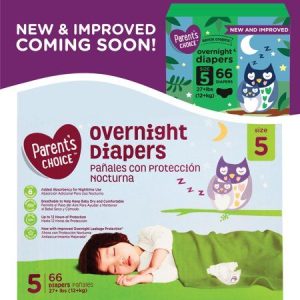Choosing diapers is an important part of caring for a baby. With so many options available, parents may wonder if overnight diapers are necessary. This article explores the pros and cons of overnight diapers and helps you decide what’s right for your little one.
Understanding Overnight Diapers
Overnight diapers are designed to be more absorbent than regular diapers. They typically contain more material to hold larger amounts of liquid, helping your baby sleep through the night without leaks.
Are overnight diapers thicker? Yes, overnight diapers are generally thicker than regular diapers due to the extra absorbent material.
When might a baby need an overnight diaper? Some babies sleep for longer stretches at night and may need the extra absorbency of an overnight diaper.
Pros and Cons of Overnight Diapers
Pros:
Longer Sleep Periods
- Undisturbed Sleep: Babies can sleep longer without waking due to wetness, promoting better rest for both baby and parents.
- Reduced Nighttime Changes: Fewer diaper changes mean less disruption to sleep routines, benefiting overall sleep quality.
Convenience for Parents
-
- Ease of Use: Overnight diapers simplify nighttime diaper changes, allowing parents to focus on soothing and comforting their baby back to sleep.
- Less Mess: Enhanced absorbency reduces the risk of leaks, minimizing the need for bedding changes during the night.
Cons:
- Cost: Overnight diapers can be more expensive than regular diapers.
- Bulkier fit: The extra material can make overnight diapers feel bulkier on your baby.
- Not always necessary: Some babies may not need the extra absorbency of an overnight diaper.
Signs Your Baby Might Need an Overnight Diaper
- Frequent leaks at night: If your baby consistently leaks through regular diapers at night, an overnight diaper might be a good solution.
- Long stretches of sleep: If your baby sleeps for extended periods at night, an overnight diaper can help prevent leaks.
- Skin sensitivity: If your baby experiences diaper rash from frequent wetness at night, an overnight diaper might help.
Alternatives to Overnight Diapers
- Sizing Up: Sometimes, simply using a diaper one size larger than your baby’s daytime size can provide more leak protection at night.
- Double Diapering: Some parents choose to layer a disposable liner inside a regular diaper for extra absorbency. Talk to your pediatrician before trying this method.
- Nighttime Potty Training: If your baby is approaching toddlerhood, you might consider nighttime potty training to reduce diaper changes altogether.
The decision of whether or not to use overnight diapers is a personal one. There’s no right or wrong answer. Consider your baby’s individual needs, sleeping habits, and your budget when making your choice.
Here are some additional tips:
- Talk to your pediatrician if you have any questions about overnight diapers or other diapering options.
- Experiment with different brands and sizes to find the best fit for your baby.
- Pay attention to your baby’s comfort and adjust your diapering routine as needed.
Overnight diapers can be a helpful tool for parents looking to prevent leaks and promote longer stretches of sleep for their babies. However, they aren’t necessary for every baby. By understanding the pros and cons, and considering your baby’s individual needs, you can make an informed decision about overnight diapers.
Factors to Consider
1. Baby’s Age and Sleeping Habits
- Infant Needs: Newborns and younger babies may wake frequently for feeding and diaper changes, making overnight diapers less critical.
- Sleep Patterns: As babies grow older and sleep longer stretches at night, overnight diapers can provide uninterrupted sleep and reduce discomfort from wetness.
2. Absorbency and Comfort
- Enhanced Absorption: Overnight diapers offer higher absorbency, ideal for babies who urinate more during the night.
- Skin Protection: Keeping babies dry overnight can help prevent diaper rash and skin irritation caused by prolonged exposure to moisture.

When Overnight Diapers May Not Be Necessary
1. Light Sleepers
- Frequent Waking: Babies who wake frequently may benefit less from overnight diapers if diaper changes are already part of their nighttime routine.
- Daytime Alternatives: Using highly absorbent daytime diapers or diaper inserts may suffice for babies who do not sleep long stretches at night.
2. Budget and Preferences
- Cost Considerations: Overnight diapers can be more expensive than regular diapers. Parents may opt to use them selectively based on their budget and baby’s needs.
- Environmental Impact: Some families choose cloth diapering or eco-friendly alternatives for sustainability reasons.
Choosing the Right Overnight Diapers
1. Size and Fit
- Proper Sizing: Ensure the diaper fits snugly around the legs and waist to prevent leaks without causing discomfort.
- Adjust as Needed: Monitor baby’s growth to adjust diaper sizes accordingly for optimal fit and performance.
2. Testing Different Brands
- Trial Period: Experiment with different overnight diaper brands to find one that offers the best combination of absorbency, comfort, and fit for your baby.
- Parent Reviews: Consider feedback from other parents regarding effectiveness and reliability of overnight diapers.

Overnight Diapers: Tips for Effective Use
To maximize the benefits of overnight diapers and ensure they meet your baby’s needs, consider the following tips and strategies:
1. Establish a Bedtime Routine
A consistent bedtime routine can help signal to your baby that it’s time to sleep, reducing nighttime awakenings. Include diaper changes as part of this routine to ensure your baby starts the night in a fresh diaper.
2. Monitor Absorbency Needs
Pay attention to how much your baby urinates during the night. If your baby frequently wakes due to a soaked diaper, consider using overnight diapers with higher absorbency or adding diaper inserts for extra protection.
3. Diaper Changing Technique
When changing diapers at night, aim for minimal disruption to your baby’s sleep. Use gentle lighting and avoid stimulating activities to help your baby settle back to sleep quickly.

Conclusion: Choosing What’s Best for Your Baby
While overnight diapers can provide convenience and enhance sleep quality for many families, they are not a one-size-fits-all solution. Understanding your baby’s unique needs, monitoring absorbency, and considering alternatives like cloth diapering or diaper inserts can help you make an informed decision.
By prioritizing comfort, skin health, and environmental considerations, parents can navigate the world of overnight diapers confidently. Whether you opt for disposable diapers, cloth alternatives, or a combination based on your baby’s needs, supporting their nighttime comfort contributes to overall well-being.







